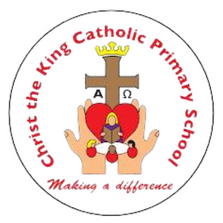Telephone +44 (0)1454 866680
DESIGN & TECHNOLOGY (DT)
Our Mission Statement
'Making a difference by inspiring a love of life and learning for all. We build strong foundations within God's loving hands'.
Our Core Values
We provide a Catholic Christian education based on the life and teaching of Jesus Christ. Our Core Values. Our Core Values are inspired by Gospel values and stem from love - love is forgiveness, sharing and kindness. They are:
- Responsibility
- Compassion
- Respect
- Honesty
- Perseverance
- Courage
At Christ the King Catholic Primary School we inspire our children to have a lifelong love of learning through a broad, enriched and balanced curriculum. We aspire for all children to be the best they can be and make a difference to our world by building strong foundations within God’s loving hands.
Our Approach, Aim, and Curriculum
Our key curriculum drivers are:
- Inclusivity
- Creativity
- Curiosity
- Oracy
Intent
At Christ the King Catholic Primary School, we aim to inspire a lifelong curiosity about the world. Teaching should inspire pupils to be innovative and creative thinkers who have an appreciation for the product design cycle through ideation, creation and evaluation. Pupils will be given the knowledge linked to electrical and mechanical systems and computer programming. Pupils will develop the confidence to take risks, through drafting design concepts, modelling and testing and to be reflective learners who evaluate their work and the work of others.
Pupils will learn about how to create, experience and participate in great arts and culture. Skills taught will cover planning, designing, tinkering, evaluating. Design and Technology will be linked to other subject areas where applicable, developing our cross-curricular approach. The National Curriculum informs our chosen topics, which are sequential and include progression of skills. Children will understand how Catholic virtues and British Values relate to Design and Technology. There will be opportunities beyond the classroom for real life learning and for pupils to visit places they may not otherwise visit. Pupils will become resourceful, enterprising citizens who will have the skills to contribute to future design advancements.
Implementation
Design and Technology is taught in blocks throughout the year so that children develop a deep and secure understanding. There are also links between Design and Technology and other areas of the curriculum where appropriate and where it adds value to both the subjects. Skills are built on year on year and sequenced appropriately throughout the school and lessons are planned using this document. Monitoring occurs regularly by the Curriculum Lead. Design and Technology is broken down into three main stages of the design process which include: design, make and evaluate. Each stage of the design process is underpinned by technical knowledge which encompasses the contextual, historical, and technical understanding required for each strand. Cooking and Nutrition has a focus on specific principles, skills and techniques in food, including where food comes from, diet and seasonality. The National Curriculum organises the Design and Technology attainment targets under five subheadings or strands: Design, Make, Evaluate, Technical Knowledge and Cooking and Nutrition.
Through our Design and Technology scheme, pupils respond to design briefs and scenarios that require consideration of the needs of others, developing their skills in five key areas: Design, Make, Evaluate, Cooking and Nutrition and Mechanisms. Each of the key areas follows the design process (design, make and evaluate) and has a particular theme or focus from the technical knowledge. Lessons incorporate a range of teaching strategies from independent tasks, paired and group work including practical hands on, computer based and inventive tasks. This variety means that lessons are engaging and differentiated guidance ensures that lessons can be accessed by all pupils.
Impact
By the time pupils leave they will:
- Be equipped with a range of skills to enable them to succeed in their secondary education and be innovative and resourceful members of society.
- Understand the functional and aesthetic properties of a range of materials and resources.
- Understand how to use and combine tools to carry out different processes for shaping, decorating and manufacturing products.
- Be able to build and apply a repertoire of skills, knowledge and understanding to produce high quality, innovative outcomes, including models, prototypes and products to fulfil the needs of users and scenarios.
- Understand and apply the principles of healthy eating, diets and recipes, including key processes, food groups and cooking equipment and learn how to cook.
- Have an appreciation for key individuals, inventions and events in history and of today that impact our world.
- Develop the creative, technical and practical expertise needed to perform everyday tasks confidently and to participate successfully in an increasing technological world.
- Critique, evaluate and tests their ideas and products and the work of others.
We will measure the impact of our curriculum through the following methods:
- Both formative and summative assessments.
- Summative assessment of pupil discussions
- Images and videos of practical learning
- Pupil voice
- Moderation staff meetings

Christ the King Catholic Primary School is a Voluntary Aided primary school. Registered Office: Easton Hill, Road, Thornbury, Bristol. BS35 1AW
Christ the King Catholic Primary School
